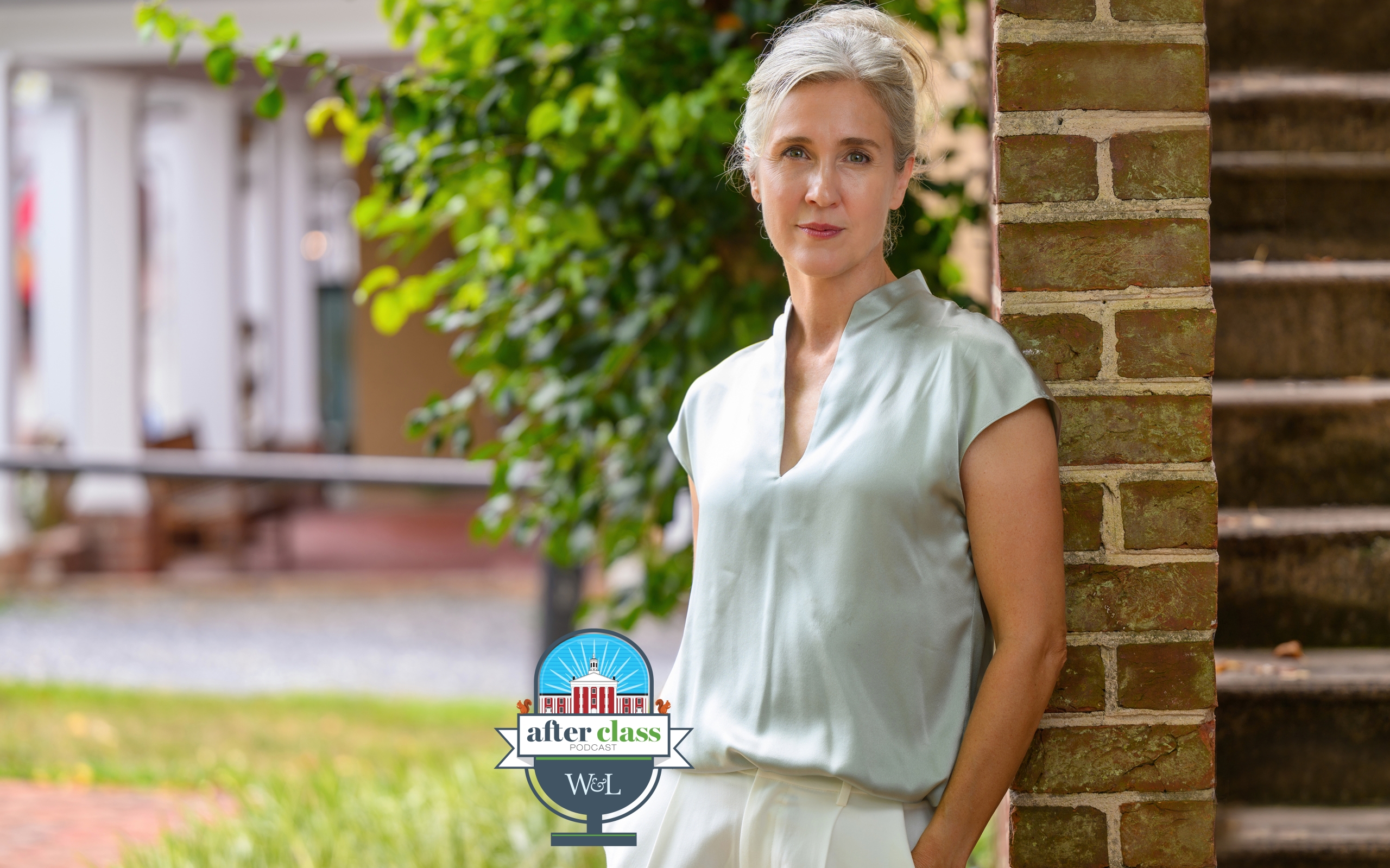‘W&L After Class’ Podcast Releases New Episode Featuring Melissa Kerin In this month’s episode, Kerin, professor of art history, discusses how following her curiosity of the ways in which people tell stories opened her to opportunities to study remote Buddhist shrines in the Himalayas and examine how we live and die as the director of the Roger Mudd Center for Ethics.

I find that sometimes we have a siloing effect in art history, where Asia is over there, Europe is over there and America is here. But there are so many linkages and connections between and among these places that I’m proud of being able to teach this material and share it with others and make it become alive and mean something a little bit to students.”
~ Melissa Kerin, professor of art history at Washington and Lee University and director of the Roger Mudd Center for Ethics
The metaphorical question of “who has a seat at the table?” spills into conversations of ownership, history — the dictation of what’s chosen to be remembered — and ethics. Upon reflecting on her career and the opportunities she’s followed, Melissa Kerin, professor of art history and the director of the Roger Mudd Center for Ethics, finds that question — and the stories excluded from its answer — at the center, guiding her intrigue. In the latest episode of the “W&L After Class” podcast, she and associate director of Lifelong Learning Ruth Candler delve into how this curiosity led a Buddhist art historian to become the director of the Mudd Center for Ethics, leading the 2024-2025 program “How We Live and Die: Stories, Values and Communities.”
In this episode, “Shaking Up the Consciousness,” Kerin explains this year’s theme for the Mudd Center, the unifying way that medical ethics affects us all and the pivotal role of storytelling within this scientific narrative. She articulates the intrinsic connection that Buddhist history has with the meaning of life and finality and how her background as an art historian walks alongside the Mudd Center’s ethical topic. From studying theater as a high schooler to majoring in women’s studies at Trinity College, Kerin takes listeners on her journey to discovering Himalayan Buddhist art. As she remembers stories from her travels to remote shrines in India and Tibet, she calls us to look beyond these artifacts’ aesthetic beauty and instead to understand the social power they possess in their original context and the ethics that come with respecting cultural heritage.
“These shrines can be understood as repositories of memory,” Kerin said. “People give them old photographs of the Dalai Lama or bodhisattvas, postcards that they got on pilgrimage, pieces of rocks or a piece of soil, dirt that they get on pilgrimage to Tibet — and they bring it, and they put all of this on the altar. It becomes this kind of social network, but it’s beyond that. It’s a network of sacred geography as well, and it’s past and present. You’ll have images from generations past in your family, and they’re all religious in subject matter and content. They end up on these shrines, and it’s this incredible experience to go through, to talk to the owners of these shrines and to get the individual stories of each object. This shrine thus becomes a kind of social history.”
“W&L After Class” entered its fifth season on Feb. 13. The season started with Rob Straughan, the Crawford Family Dean of the Williams School and professor of business administration, who described his journey at W&L, the evolution of the Williams School’s distinctive approach within a liberal arts curriculum and the exciting initiatives on the horizon, including the new Williams School building. This season also includes Wythe Whiting, professor of cognitive and behavioral science, who discussed the complex connections between mental health, sleep, physical activity and cognitive functioning; Paul Youngman, associate provost and the Harry E. and Mary Jayne W. Redenbaugh Professor of German, who details the ever-changing roles W&L has played in his life; Mark Drumbl, Class of 1975 Alumni Professor of Law and Director of the Transnational Law Institute, who explains the function and limitations of law through his research and teachings in mass violence and human rights; Jenefer Davies, professor of dance and chair of the department of theater, dance, and film studies, who built W&L’s dance program to be a place where the liberal arts education flourishes; and Lisa Alty, John T. Herwick, M.D. Professor of Chemistry, who detailed the 37-year evolution of her teaching at W&L and her passion for the pre-health curriculum.
The podcast series began in spring 2020 and is a collaborative effort of Lifelong Learning, Alumni Engagement and the Office of Communications and Public Affairs. Each episode invites listeners to experience conversations with W&L’s expert faculty, giving listeners worldwide a chance to stroll the Colonnade in the comfort of their homes. W&L faculty members discuss their teaching, research and special interests. Previous topics include poetry, witches, cybersecurity, theater and free speech.

You must be logged in to post a comment.